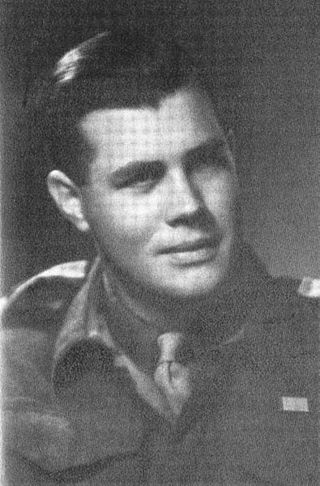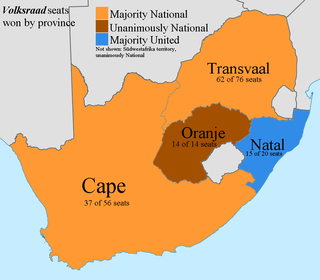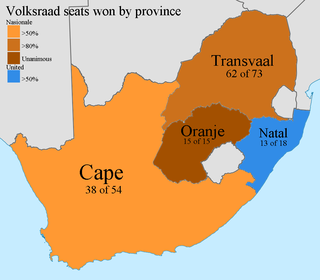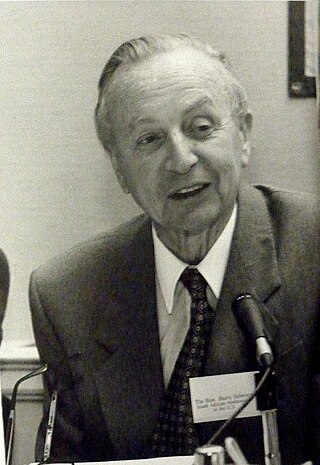
The Democratic Alliance is a South African political party and the official opposition to the ruling African National Congress (ANC). The party is broadly centrist, and has been attributed both centre-left and centre-right policies. It is a member of Liberal International and the Africa Liberal Network. The DA traces its roots to the founding of the anti-apartheid Progressive Party in 1959, with many mergers and name changes between that time and the present. The DA ideologically shows a variety of liberal tendencies, including social liberalism, classical liberalism, and conservative liberalism.

The Liberal Party of South Africa was a South African political party from 1953 to 1968.

The United Party was a political party in South Africa. It was the country's ruling political party between 1934 and 1948.

Helen Suzman, OMSG, DBE was a South African anti-apartheid activist and politician. She represented a series of liberal and centre-left opposition parties during her 36-year tenure in the whites-only, National Party-controlled House of Assembly of South Africa at the height of apartheid.

The Progressive Federal Party (PFP) was a South African political party formed in 1977 through merger of the Progressive and Reform parties, eventually changing its name to the Progressive Federal Party. For its duration was the main parliamentary opposition to apartheid, instead advocating power-sharing in South Africa through a federal constitution. From the 1977 election until 1987 it was the official opposition of the country.
Liberalism in South Africa has encompassed various traditions and parties.

Colin Wells Eglin was a South African politician best known for having served as national leader of the opposition from 1977–79 and 1986–87. He represented Sea Point in the South African Parliament from 1958–61 and from 1974–2004. Described by Nelson Mandela as "one of the architects of democracy", Eglin played a leading role in the drafting of the country's post-apartheid constitution.

Harry Gordon Lawrence (1901–1973) was a South African politician.

General elections were held in South Africa on 24 April 1974. They were called one year earlier than scheduled by Prime Minister John Vorster on 4 February. The House of Assembly was increased from 166 to 171 members. The election was once again won by the National Party, with a slightly increased parliamentary majority.

General elections were held in South Africa on 18 October 1961. They were the first general elections after South Africa became a republic following the 1960 South African referendum. The National Party under Hendrik Frensch Verwoerd won a majority in the House of Assembly.

General elections were held in South Africa on 16 April 1958. The result was a victory for the National Party, now under the leadership of J.G. Strijdom after the retirement of Daniel Malan in 1954. The opposition United Party campaigned for the first time under De Villiers Graaff, who would remain party leader for two decades.
General elections were held in South Africa on 22 April 1970 to elect members of the 166-seat House of Assembly. Parliament was dissolved on 2 March and the deadline for the submission of candidates was 13 March.

General elections were held in South Africa on 30 March 1966. The result was another comprehensive victory for the National Party under Hendrik Frensch Verwoerd.

Harry Heinz Schwarz was a South African lawyer, statesman and long-time political opposition leader against apartheid in South Africa, who eventually served as the South African Ambassador to the United States during the country's transition to majority rule.
The Reform Party was an anti-apartheid political party that existed for just five months in 1975 and is one of the predecessor parties to the Democratic Alliance. The Reform Party was created on 11 February by a group of four Members of Parliament (MPs) who left the United Party under the guidance of the leader of the United Party in the Transvaal, Harry Schwarz, who became the party's leader. Schwarz and others were staunchly opposed to apartheid and called for a much more rigorous opposition to the National Party. They said that they no longer felt the UP was "the vehicle in which we can travel the path of verligtheid". The party had four MPs, two senators, ten members of the Transvaal Provincial Council, 14 out of the 36 Johannesburg City Councillors and four Randburg City Councillors. This made it the official opposition in the Transvaal Provincial Council.

Zacharias Johannes de Beer was a South African politician, businessman and diplomat. A liberal Afrikaner, he was the last federal leader of the Progressive Federal Party and then the co-federal leader of the Democratic Party.

Johannes "Jan" van Aswegen Steytler was a liberal South African politician and the first leader of the Progressive Party (PP). He was born in Burgersdorp, in the then Cape Province now Eastern Cape Province.
Although the Democratic Alliance of South Africa in its present form is fairly new, its roots can be traced far back in South African political history, through a complex sequence of splits and mergers.

Ray Albert Francis Swart was a white liberal South African politician who spent his life in opposition to the apartheid policies of the government. He was educated in Durban at Glenwood High School and the University of Natal, where he graduated as a lawyer. At a very early age he became interested in politics and was initially a supporter of the United Party, for which in 1953, he was elected, at the age of 25, Member of Parliament for Zululand.















